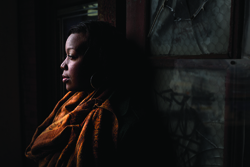An Arresting Development
Just Hours Before Receiving an Award for Community Service, Khadijah White ’04 Found Herself in a Philadelphia Jail

Recalling the arbitrary mass arrests that she witnessed at Occupy protests in the preceding months (which judges have consistently thrown out in court), Khadijah White told herself, “I am not getting arrested,” as she approached a public hearing on a proposed ban on feeding the homeless. In total, her arrest lasted 21 hours. Photo by Laurence Kesterson
It was cold, and her dissertation beckoned, but Khadijah White ’04 was determined as she made her way through the heavily policed throng outside of Philadelphia’s Municipal Services Building to stand alongside her “Occupy” friends on the night of March 15, 2012. Camps of the Philadelphia affiliate of Occupy Wall Street were long gone, but those organizers who established ways of feeding the campers and their itinerant counterparts had continued serving the homeless after activists had cleared out. That night’s hearing before the city’s Board of Health was to review Mayor Nutter’s proposed ban on public feedings on city parkland, and many Occupy followers returned with other longtime homeless-service volunteers to voice dissent.
The amount of police activity made little sense to White, who was drawn to the hearing to stand alongside fellow activists and observe. Officers with video cameras dotted the crowd, and others placed firm, authoritative hands on the shoulders of the few activists and homeless allowed into the hearing. White felt uneasy about the unusually heavy police presence, and tonight wasn’t the night to tempt fate. The next day, 28-year-old White would receive the Woman of Color at Penn Award for her on-campus leadership. White—whose eight-page C.V. lists accomplishments like a White House internship, a United Nations reporting fellowship, and her role as founder of Swarthmore’s Dare to Soar program—had never won an award.
She hung back, made small talk, and left after 30 minutes to do some last-minute grocery shopping before her out-of-town guests arrived for the award luncheon. At the grocery store, she discovered a stack of flyers forgotten in her bike basket by a friend at the hearing. Heart sinking, she realized she had to ride back to the crowd to return them.
She arrived to find the group lined up, single file, but only a few were allowed into the public meeting.
“Ten more minutes and I’ll leave. Ten more minutes …” ran through her head like a prophetic mantra. But soon, White found herself at the front of the line demanding answers.
“I was trying to figure out if we could get someone to come down and explain why no one was getting in,” says White.
The police lined up and, wielding their bikes to create a barrier, pushed the crowd back in short bursts. White recalls a moment of eerie silence right before one such push. The rest is a scene of pure confusion: a screaming police officer, White’s bike plunged down a flight of stairs—groceries, purse, wallet, and cell phone air borne—a searing pain in her pinky, wrenched back at a 90-plus degree angle by a large police officer as he dragged her backwards over the barrier of bicycles, leaving tire tracks across her legs.
“They’re breaking my finger!” she screamed as she was hauled inside and cuffed. From the police van, she called to her friends to let her mother know where the tickets for the next day’s ceremony were.
“Khadijah White was wrongfully and outrageously arrested last night for the very thing for which she’s being honored: community service and vision,” announced her best friend and fellow Penn Ph.D. student, Maryan Soliman, at the ceremony the next day. The stunned audience paused, then loudly applauded.
White, finger broken and in pain, sat in a jail cell, still confused and disappointed by the night’s events. As she sat there amid the cockroaches, a seatless toilet, and two cellmates, she felt embarrassed at the attention the arrest might garner. She had no idea that across town she was being feted, her arrest a meritorious affirmation. She was released the next evening, charged with resisting arrest, harassment, and disorderly conduct—ultimately all charges were dropped, disproved by the police videotapes of that day.
White has since completed a Ph.D. in communications and has accepted a tenure-track position as an assistant professor at Rutgers University beginning this fall. Meanwhile, she also is suing the city of Philadelphia.
“My arrest is important in terms of understanding how social movements are being suppressed,” says White, who remarked with irony that one of the two jails she was in that night is next to the Whole Foods where she shops. “However, being in that space reminded me of how dehumanizing our system is, and I experienced firsthand the kind of treatment millions of Americans go through every day. I almost wish it were a requirement that everyone spend a day in jail—it puts a lot about our society into perspective.”
 Email This Page
Email This Page